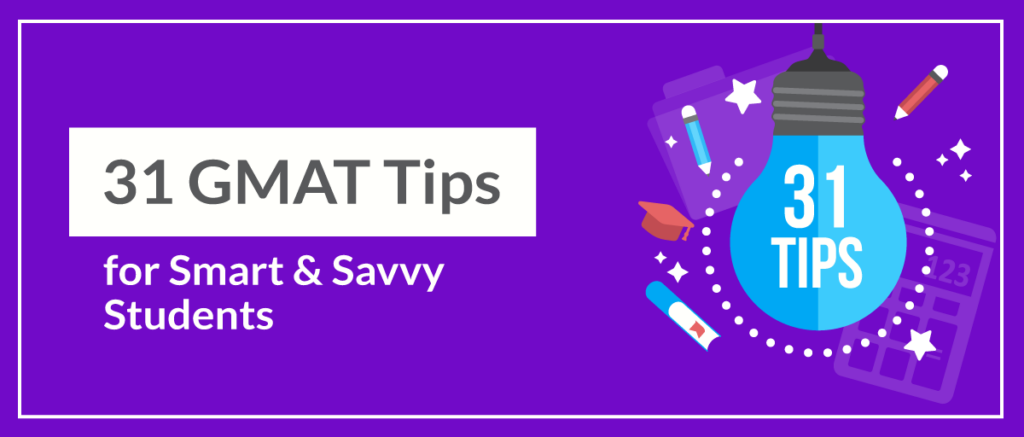
To get a perfect GMAT score (or close to it), you need to be good at math, good with words, and have exceptional recall and logic skills. But, of course, you’re only human. You need GMAT tips that regular, busy people can use to pass the GMAT with a great score.
The reality is that the GMAT is a difficult test. Preparing for it can be a full time job, at least for a while, and many people already work full time when they decide to pursue an MBA.
If you can implement some of the tips we’re about to lay down, you’ll have a much better chance of getting a high score. Your GMAT preparation can be the deciding factor in getting into your top choice MBA program.
The best way to ace the GMAT is to have a perfect memory, supernatural discipline, and unlimited free time to study. But these GMAT tips can help anyone make a plan, maximize their study time, and cover all skills needed to be ready on test day.
Best Way to Study for the GMAT
First, remember that the best way to study for the GMAT is the one that will work for you. There are a variety of well-reviewed GMAT review courses to suit a variety of budgets, learning styles, and specific topics. Study materials will include video courses from expert instructors, the option for GMAT tutoring, GMAT textbooks and more.
Depending on your learning style and background, you’ll want to do some digging to find the right GMAT course.
What’s the best GMAT prep book for you? What’s the right GMAT study plan? There are some proven tips and strategies for how to pass the GMAT. But none of it is accessible without the right mile markers and course guidance.
This research is a vital first step because a course should provide all of the tools you need to chart a path to success. Picking one you can learn fast and be comfortable with will get you much closer to perfection.
Once you’ve got the GMAT course you need, here’s how you get maximum benefit from every second you spend studying.
GMAT Study Tips
The GMAT is a unique kind of test. It does cover a broad range of topics but is mostly about your ability to apply concepts and get at the core meaning of texts or equations. These skills aren’t developed overnight.
Here are some GMAT study tips to apply to your dedicated studies.
Make a plan and stick to it
Whether you’ve picked a GMAT test date six months or three months in the future, you should have a GMAT study plan in place for your day to day studies.
Block out time
GMAT studying isn’t a “when you get a minute” activity. Schedule it like you would a block of work hours or social time. Keep that appointment every time.
Create a conducive environment
In college or at any other “test studying” time of your life, you may have studied with the TV on or with noisy roommates around. The GMAT may require a little more focus than that. Find (or create) an environment that helps you focus.
Work systematically through the test sections
The GMAT has four main sections:
- Analytical Writing Assessment
- Integrated Reasoning
- Quantitative Reasoning
- Verbal Reasoning
Get familiar with these four sections and the kind of content they will present you with. Then, work systematically through content in each of the four sections.
Know your weaknesses
It’s easy to focus on areas in which you excel. You don’t get bonus points on the GMAT. You must cover all four sections of the exam as thoroughly as possible, excelling in each, if you’re going to get a high score.
Create a system of visualization
There are a lot of charts, tables, symbols, and points that require visual literacy on the GMAT. Especially in Quant, you’re going to need to interpret these symbols very quickly to get to the heart of the question. Practice it.
Do it in your head (mental math)
You won’t get to use a calculator in Quant. You have to be able to do basic math in your head. If this hasn’t been a strength of yours previously, it’s even more important to get it down now. Your GMAT score could depend on it.
Practice and practice again
Practice tests and practice question banks for the GMAT are your friends. Buy a program that has plenty of them. Take practice tests diagnostically and then to measure your progress as you move through your study plan. Read answer explanations, fully understanding where you went wrong and how to course-correct next time.
Here’s a list of the best GMAT practice tests online.
Don’t get stuck
Sometimes, certain equations, logic scenarios or sections of the test will just be hard for you as an individual. This can be discouraging or even cause a hang up in your progress. You may find a few sessions with a GMAT tutor is all you need to get over this hurdle. Whatever investment it takes, don’t let it slow you down.
GMAT Writing Tips

Because so many test-takers focus on how to master the Quant section, it’s easy to gloss over GMAT Analytical Writing. But it merits attention. Being good with words is not going to get you a perfect GMAT score. The writing is going to require some careful thought and curation to hit the right notes and adequately display understanding.
Here are some GMAT writing tips.
Improve your skills of analysis
GMAT writing questions will require a response to a posed scenario. Often, you will be presented by questions that are similar to those in the Integrated Reasoning section. You will be required to analyze the text, draw out assumptions, analyze arguments, and more. It requires practice.
Make a thesis
There should be a core premise to whatever line of thought you choose to pursue in your writing. This will serve a touchstone for all of your related arguments and reasoning.
Provide evidence
Supporting evidence (and any actual content you need) will be present in the initial text. If you feel like you’re “missing something,” look closer. Re-read it. And then be sure that you don’t make any baseless claims.
Stay objective and impartial
The goal of your writing piece isn’t to convince anyone of the truth, it’s simply to present a coherent, well-organized argument. Make objective, factual statements and a summarial conclusion.
Keep it concise
The goal here is not to be wordy. Don’t overstate things or say the same thing two different ways. Find the best way to say something and then say it. Once. Concisely.
GMAT Integrated Reasoning Tips
In the Integrated Reasoning part of the GMAT, you’ll be given a question and then asked to perform two or three related tasks. You won’t get partial credit, so you need to answer each question completely. You will have access to an online calculator to help you complete any equations.
Here are some GMAT Integrated Reasoning tips.
Learn how to read graphs, charts and tables
There is a lot of graphical representation in the Integrated Reasoning portion of the GMAT. Practice to enhance your proficiency in interpreting graphs, charts and tables. This will include quickly seeing trends, connections, direct relationships and more.
Organize information
Data and numbers will be given to you in a wide variety of formats. Learn how to quickly organize it in a way that makes sense to you and lets you make the right comparisons or conclusions.
Practice reading comprehension
Integrated Reasoning is a convergence of math and language skills. As such, you may be given passages of text and then asked to decipher meaning or extract connections. All of this can only be achieved through practice. The Economist GMAT course comes with a digital subscription to the magazine, which is perfect material to use for practice.
Learn the calculator
You’ll get access to a digital, on-screen calculator in this section of the GMAT. Practice with one before test day. Use it often enough that you get comfortable performing basic math functions on it. This way, it won’t slow you down on the day of your GMAT.
Get the pacing down
Many people get tripped up by the timing of this section of the GMAT. There are 12 questions and you have 30 minutes. Using timed GMAT practice tests often will help you develop the right rhythm.
GMAT Verbal Tips and Tricks
The GMAT Verbal Reasoning section is meant to gauge your ability to comprehend written text, to reason through arguments, and express ideas. You will have 36 multiple choice questions and just over an hour.
Here are some GMAT Verbal tips.
Put it in plain terms
Depending on your background and how proficient you feel in this section, you may get tripped up by unfamiliar vocabulary or terms. That’s unnecessary. In practice, learn to rephrase things that you find confusing. That way, as you re-read or seek to gain better understanding, you aren’t “interpreting” the text each time.
Figure out the actual question
Because this is a language-oriented section, all of your questions will be set in a narrative and may come with extra sentences of explanation. It’s important to be able to (quickly) figure out the point. This will come with practice.
Pay attention to question stems
Question stems will clue you in to what kind of question is coming up. If you read this before the argument, you’ll already have a context in your mind for what you’re looking for.
Know your math terms
Even though this section of the test is about verbal skills, there will be plenty of equations and math-related terms. As you study for Quant, your mathematical literacy will go a long way in accelerating your progress through Verbal as well.
GMAT Quantitative Tips
Quant may be a notoriously hard section of the GMAT, but it doesn’t have to be intimidating. There are plenty of resources to help you prepare. Some courses, like Target Test Prep GMAT are focused only on quant prep and provide all the material and practice you need to master this section.
You’ll get two kinds of questions: problem solving and data sufficiency. There are 31 questions in total and you have 62 minutes.
Here are some GMAT Quant tips.
Don’t forget the basics
Quant is, at heart, meant to test high school level math concepts. This includes algebra and geometry. These are basic concepts. They’re so basic, you don’t even need a calculator (also, you can’t have one). Go back to the basics in your studies, to be sure you don’t miss the easy stuff.
Break it down
Many experts recommend that you approach Quant questions by first discerning what you already know. In other words, the problem may be posed in a complex way, but asking a very simple question. Solve it in parts if you must, starting with the most familiar ideas first.
Memorize the five
In data sufficiency questions, you will have five answer choices. These are readily available (just Google it) and easy to memorize. And, you should memorize them. This will help you find the right answer much faster.
Make an error log
As you practice for Quant, track your errors. Identify patterns of concepts or skills you routinely miss and make a plan to learn more about those areas.
Do timed practice
Quant is definitely a section where people are apt to get in the weeds. Don’t fall prey to the ticking clock. Practice in timed sessions so this skill is also well-developed for test day.
GMAT Test Taking Tips

This may feel a little like drinking from the fire hydrant, but this final round of tips will help with test-taking in general. The GMAT requires the development of a lot of very specific skills, including the skill of performing well under the pressure of a timed exam.
Practice tests will help you with this, so make sure your GMAT study materials include plenty of them.
It is all doable, if you put the right amount of time and effort into it. Here are some final GMAT test taking tips:
Improve Your Guesses
Some people (let’s face it, probably every person) will have to guess at some point on the GMAT. You can improve your guesses by interacting with as much practice material as possible.
This will help you quickly identify important data and make educated guesses, rather than random ones. Practice eliminating multiple-choice answers that you know are wrong first, then quickly deciding between the remaining options.
While this may not help you in all sections of the GMAT, it can help you in some, raising your overall score.
Learn the Test Itself
Because there are four vast areas of critical thinking to work on, it’s easy to get distracted from the actual test-taking skills you’ll need to succeed. You have to be familiar with the unique format of the test you’re taking and be ready for some important test-day decisions.
Some sections are computer adaptive, meaning the questions adjust in difficulty level based on your answers as you go. You can also choose the order in which you complete the sections.
That’s why it’s so important to punctuate your studies with plenty of GMAT practice tests, to offset any information overload and provide perspective.
Know When You’re Ready
Optimal test-readiness will occur at some point. And then it will decline. All of your hard work will add up to proficiency and you should take the test when you are at that point. If you wait too long, your skills will get out of practice or you will forget. Don’t hesitate to schedule the GMAT when you know that you are at optimal test-readiness.
